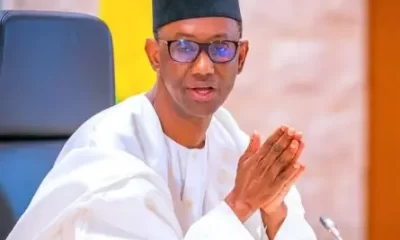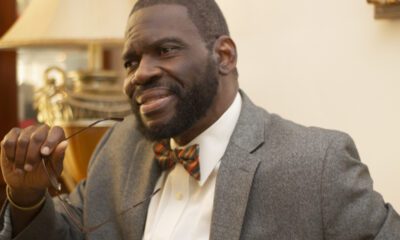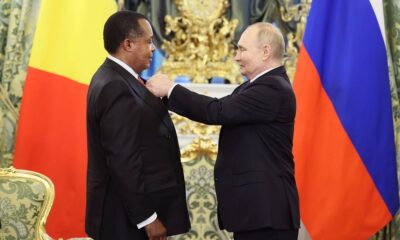National Issues
On Fulani rapists and the quest for peace -By Abimbola Adelakun

Certain things in Nigeria’s public sphere signal our country’s level of (under)development; one of them is the presence of cows and herdsmen in public spaces. Cows have been an incongruous feature of our urban landmark for a while, their bovine nuisance strolling leisurely among other paraphernalia of urban modernity.
This seeming desecration happens even in the capital city, Abuja. Humans and animals share space despite the city’s pretence to development and progressive urban landscaping. These animals are a not-so-subtle reminder of the audacity of the Fulani herdsmen; their putative stubbornness, and hegemonic sense of possession of Nigeria’s public space.
Lately, far from the maddening Abuja crowd of cows and men, in Enugu, there were public demonstrations against the crimes of Fulani herdsmen. Women rose to protest the harms they suffered in the hands of Fulani: devastation of farmlands, destruction of agrarian enterprise, and subsequent female rape.
Raping women in times of wars or conflicts is not an act of violence based merely on primal urges. Rather, it is underwritten by misogyny. These rapists see women’s bodies as an extension of the theatre of war and they violate them for at least three reasons: one, they do not see the humanity of the women; two, get back at the men with whom they are directly warring; three, they exploit the neutrality of nature in sexual acts and consequent reproduction to plant their seeds in the women.
The evils that have been attributed to Fulani herdsmen all over Nigeria are legion. Tellingly, they were the same ones accused of abducting a former presidential candidate, Chief Olu Falae. Until Falae’s abduction, many of the accusations levelled against Fulani herdsmen were no longer new.
What is novel is the frequency these acts of destruction are coming up in media reports these days. One wonders, are these spate of relentless attacks on communities really increasing or they are only being boisterously reported than before? If the latter, is this development in any way connected with national politics?
In other words, now that Nigeria has a President of Fulani extraction, are the sins of fellow Fulani men being visited on him by accentuating their crimes through reporting tinged with mischief? Note that the media do not merely report the killings, the plunder and the rapes by pointing out these acts were carried out by men who happened to be Fulani. Rather, ethnicity, “Fulani” itself is used to qualify the crime; thus we have expressions such as “Fulani rapists.” A part of me questioned the manner in which the ethnic identity of the men accused of abducting Falae was drummed up louder than the act of abduction itself.
This is no accident; this is politics of language and propaganda lumped together in the mixing bowl of moral panic. The media, as agenda setters quietly push a narrative into the public imaginary about conquistador Fulani whose sense of acquisition is becoming a nationwide network of different sites: from the seat of power in Abuja to rural areas in various states of the federation to the bodies of women. The last is significant because it helps us imagine the worst: Women’s abilities to reproduce means that the next frontier of the insidious battle being waged will be done with a future generation of soldiers whose identity as either villain or victim will not be easily definable.
This is not an attempt to minimise the suffering of the victim but point out that beyond sentimentality, there has to be more. For instance, the efforts of the Oyo State Commissioner of Police, Mr. Leye Oyebade, to broker peace between both Yoruba and Hausa factions seemed like a commendable initiative. In Osun and Ondo states, this model of facilitated communication between the antagonising sides is being organised by the Police and the DSS. One thing though: in the quest for peace and a return to the simplicity of life, we should not abrogate the due processes of the law to placate any side. If someone commits a crime, they should be made to pay notwithstanding if such search for justice threatens the peace of a community.
Yes, it is good to talk but that is nearly not enough. The few times when we have attempted to debate on the recurring menace of these herdsmen, issues have been imperiled by ethnic bigotry and narrow-minded postulations masquerading as solutions. Take for instance the supposed insult of Yoruba elders by a former governor of Kano State, Rabiu Kwankwaso.
While, once again, the media couched his words in infelicitous terms, I failed to see the insult. What Kwankwaso did was to insensitively rationalise the issue and speak with a fanged tongue of a politician who wants to appear politically correct while pandering to his local constituency.
He asked for understanding from the victims of his fellow Fulani’s transgressions but failed to display any understanding of their pain either. He said over time education will change the Fulani’s nomadic culture and they will learn to embrace modern ways. Two things are wrong with Kwankwaso’s position. One is to ask the victims to keep enduring the Fulani’s excesses until they get an education. He should tell that to the women who cannot go to their farmland for fear of being raped or killed; that they should wait until at least a century when the Fulani may have become as modernised or at least cultivated a sense of decency as possible. Two, is that he assumes that violent tendencies are tempered by education.
Nothing can be farther from the truth.
If education has not made Kwankwaso himself empathic, what makes anyone imagine that educating Fulani herdsmen to the point they don suits and ties will make any difference? People who destroy farmland and rape others do not do so because they do lack western or formal education. They do so because they assume proprietary rights over what belongs to others. To him, the fact of the Fulani being Nigerians gives them the right to access wherever they choose.
One thing to take away from Kwankwaso’s is this: attitude. That is why I am wary of these peace meetings being organised by the DSS and the police. Those who lack a respectful attitude for the rights of others cannot be cured of this incivility by sheer communication or a semblance of peace. Please do not get me wrong: I do not want further skirmishes in those communities. I do not want more plunder neither do I wish for more deaths. Rather, the more tenuous path of judicial process needs to be trod. People have to see that the law is not a sterile referent but an active entity that should not be sidelined. Fulani herdsmen who have raped and blundered should not simply be invited to the table to talk. They should be thoroughly investigated and charged with their crimes by a competent court. That is when there would be peace.











